-
 bitcoin
bitcoin $87959.907984 USD
1.34% -
 ethereum
ethereum $2920.497338 USD
3.04% -
 tether
tether $0.999775 USD
0.00% -
 xrp
xrp $2.237324 USD
8.12% -
 bnb
bnb $860.243768 USD
0.90% -
 solana
solana $138.089498 USD
5.43% -
 usd-coin
usd-coin $0.999807 USD
0.01% -
 tron
tron $0.272801 USD
-1.53% -
 dogecoin
dogecoin $0.150904 USD
2.96% -
 cardano
cardano $0.421635 USD
1.97% -
 hyperliquid
hyperliquid $32.152445 USD
2.23% -
 bitcoin-cash
bitcoin-cash $533.301069 USD
-1.94% -
 chainlink
chainlink $12.953417 USD
2.68% -
 unus-sed-leo
unus-sed-leo $9.535951 USD
0.73% -
 zcash
zcash $521.483386 USD
-2.87%
Does the MACD bar turning from negative to positive indicate a reversal?
The MACD bar turning positive signals rising bullish momentum, especially when confirmed by volume, RSI, or price action in crypto markets.
Jun 20, 2025 at 09:08 pm
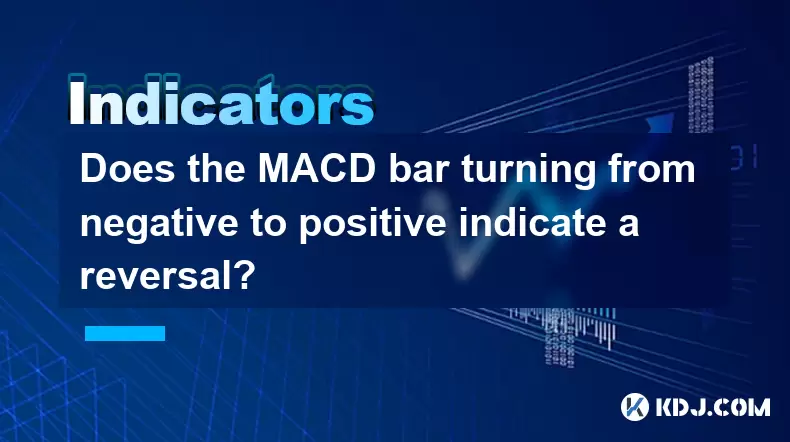
Understanding the MACD Indicator in Cryptocurrency Trading
The Moving Average Convergence Divergence (MACD) is one of the most widely used technical indicators in cryptocurrency trading. It helps traders identify potential trend reversals, momentum shifts, and entry or exit points. The MACD consists of three main components: the MACD line, the signal line, and the MACD histogram (also known as the MACD bar). When the MACD bar turns from negative to positive, it suggests a shift in momentum from bearish to bullish.
In crypto markets, where volatility is high and trends can reverse quickly, understanding what this signal means becomes crucial for traders.
The Mechanics Behind the MACD Bar Turning Positive
The MACD bar represents the difference between the MACD line and the signal line. When the MACD line crosses above the signal line, the histogram flips from negative to positive. This change visually indicates that the short-term moving average has crossed above the longer-term moving average, signaling increasing upward momentum.
- MACD line: Calculated by subtracting the 26-period EMA (Exponential Moving Average) from the 12-period EMA.
- Signal line: A 9-period EMA of the MACD line.
- Histogram: Plots the distance between these two lines.
When the histogram transitions from negative to positive territory, it reflects growing buying pressure. In fast-moving crypto assets like Bitcoin or Ethereum, this could hint at a potential upward reversal, but it should not be interpreted in isolation.
Interpreting the Signal in Different Market Conditions
The significance of the MACD bar turning positive varies depending on the prevailing market conditions:
In a downtrend: If the MACD bar moves from negative to positive during a prolonged downtrend, it may suggest weakening selling pressure and the possible start of an uptrend. However, this does not guarantee a full reversal unless confirmed by other tools like volume spikes, support levels, or RSI divergence.
In a sideways market: A positive flip in the histogram might indicate accumulation or early signs of a breakout. Traders often watch for candlestick patterns such as bullish engulfing or hammer candles to confirm this move.
In an uptrend: If the MACD bar dips below zero and then turns positive again, it may indicate a continuation rather than a reversal. This is especially true if the price remains above key moving averages.
It's important to note that false signals are common in crypto due to its volatile nature. Relying solely on the MACD bar crossing into positive territory without additional confirmation can lead to premature entries or losses.
Combining MACD with Other Indicators for Better Accuracy
To enhance the reliability of the MACD bar turning positive, traders typically combine it with other analytical tools:
Volume Analysis: A surge in volume when the MACD bar turns positive adds credibility to the reversal signal. In cryptocurrencies like Solana or Cardano, increased volume shows stronger participation and potential for a sustainable move up.
Relative Strength Index (RSI): If the RSI is rising from oversold territory (below 30) while the MACD bar turns positive, it reinforces the possibility of a bullish reversal.
Fibonacci Retracement Levels: Identifying whether the price is near a key support level when the histogram turns positive can help determine if the reversal is likely to hold.
Price Action Patterns: Look for higher lows, breakouts above resistance, or bullish candlesticks that align with the MACD histogram’s shift.
By combining these tools, traders increase their chances of accurately interpreting the MACD bar turning positive as a valid reversal signal rather than noise.
Practical Example Using Bitcoin Charts
Let’s walk through a real-world scenario using BTC/USDT on a daily chart:
- On March 15, Bitcoin was in a downtrend after hitting a local high. The MACD bar was deeply negative, showing strong bearish momentum.
- By March 28, the MACD bar started to shrink and eventually turned positive. At the same time:
- Volume picked up significantly.
- Price found support around the $60,000 psychological level.
- RSI moved out of oversold territory.
- Over the next few days, Bitcoin began forming higher highs and higher lows, confirming the reversal.
This case illustrates how the MACD bar turning positive acted as a leading indicator of a larger trend change. However, had a trader acted solely on that signal without waiting for volume or RSI confirmation, they might have entered prematurely before the actual reversal solidified.
Common Pitfalls and Misinterpretations
Traders often fall into traps when interpreting the MACD bar flipping to positive:
Overreacting to early signals: Just because the histogram turns green doesn’t mean the price will immediately follow. Patience is key in crypto, where false breakouts are frequent.
Ignoring divergences: Even if the MACD bar turns positive, if the price continues to make lower lows, it indicates bearish divergence, which may negate the reversal signal.
Using default settings blindly: Many traders use the standard MACD settings (12,26,9), but in highly volatile crypto markets, adjusting these parameters can yield better results. For example, using faster EMAs like 8, 21, 5 may provide more timely signals.
Neglecting context: A positive MACD bar during a strong downtrend may just be a retracement, not a full reversal. Always assess the broader structure and sentiment before acting.
Avoiding these pitfalls ensures traders interpret the MACD bar turning positive more accurately within the dynamic environment of cryptocurrency markets.
Frequently Asked Questions
Q1: Can the MACD bar turning positive be used as a standalone signal?No, it should always be used alongside other indicators like volume, RSI, or price action to confirm potential reversals in cryptocurrency trading.
Q2: Does the MACD work well for all cryptocurrencies?Its effectiveness varies across different assets. Larger-cap cryptos like Bitcoin and Ethereum tend to produce more reliable MACD signals compared to smaller, more erratic altcoins.
Q3: How long should I wait after the MACD bar turns positive before entering a trade?It depends on the timeframe you're trading. On daily charts, waiting for a candle close above resistance or a bullish pattern confirmation is ideal. On shorter timeframes, look for immediate volume surges.
Q4: What if the MACD bar turns positive but the price keeps falling?This indicates a divergence. It suggests that while momentum may be shifting, sellers still control the price. Treat this as a warning rather than a buy signal.
Disclaimer:info@kdj.com
The information provided is not trading advice. kdj.com does not assume any responsibility for any investments made based on the information provided in this article. Cryptocurrencies are highly volatile and it is highly recommended that you invest with caution after thorough research!
If you believe that the content used on this website infringes your copyright, please contact us immediately (info@kdj.com) and we will delete it promptly.
- Bitcoin Faces Identity Crisis as Speculators Flock to Prediction Markets and Ultra-Short Options
- 2026-02-02 00:30:06
- MGK and Jelly Roll Honor Ozzy Osbourne at Pre-Grammy Gala, Sparking Fan Frenzy
- 2026-02-02 00:50:02
- Litecoin Price Cracks 9-Year Floor Amidst Market Breakdown: What's Next for the OG Crypto?
- 2026-02-02 01:20:02
- Crypto News, Cryptocurrency Markets, Latest Updates: A Topsy-Turvy Start to 2026
- 2026-02-02 01:15:01
- New York Minute: LivLive Presale Ignites, While Solana Navigates Choppy Waters
- 2026-02-02 01:15:01
- Strategy Inc, Bitcoin, and Optimism: A Bold New Era in Digital Assets
- 2026-02-02 01:25:01
Related knowledge

How to Use "Dynamic Support and Resistance" for Crypto Swing Trading? (EMA)
Feb 01,2026 at 12:20am
Understanding Dynamic Support and Resistance in Crypto Markets1. Dynamic support and resistance levels shift over time based on price action and movin...
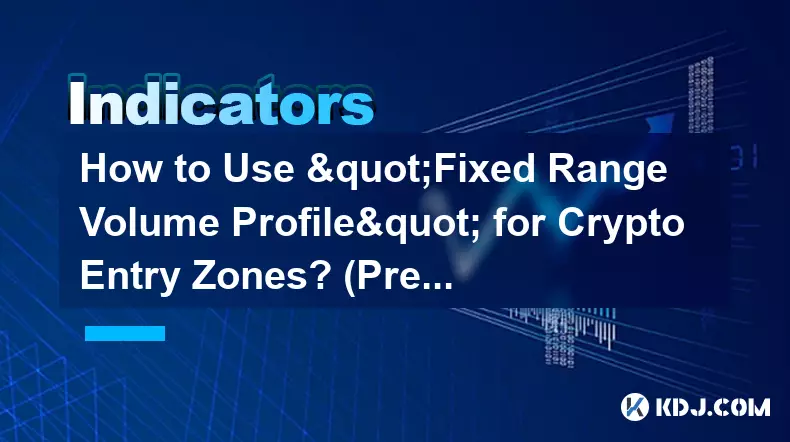
How to Use "Fixed Range Volume Profile" for Crypto Entry Zones? (Precision)
Feb 01,2026 at 10:19pm
Understanding Fixed Range Volume Profile Mechanics1. Fixed Range Volume Profile (FRVP) maps traded volume at specific price levels within a defined ti...
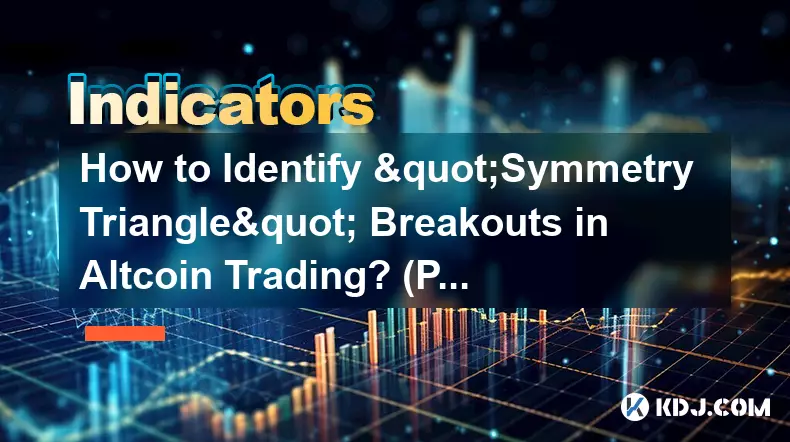
How to Identify "Symmetry Triangle" Breakouts in Altcoin Trading? (Patterns)
Feb 01,2026 at 01:39pm
Symmetry Triangle Formation Mechanics1. A symmetry triangle emerges when price action consolidates between two converging trendlines—one descending an...
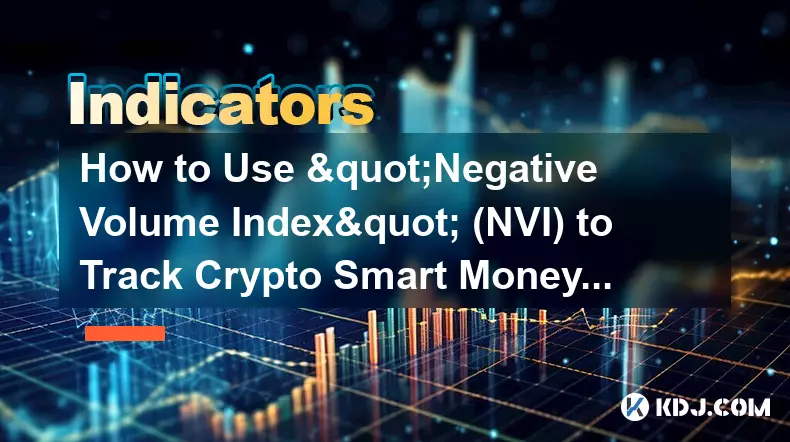
How to Use "Negative Volume Index" (NVI) to Track Crypto Smart Money? (Pro)
Feb 01,2026 at 02:40am
Understanding NVI Mechanics in Crypto Markets1. NVI calculates cumulative price change only on days when trading volume decreases compared to the prio...

How to Spot "Absorption" in Crypto Order Books? (Scalping Technique)
Feb 01,2026 at 08:39pm
Understanding Absorption Mechanics1. Absorption occurs when large buy or sell orders repeatedly appear and vanish at the same price level without trig...
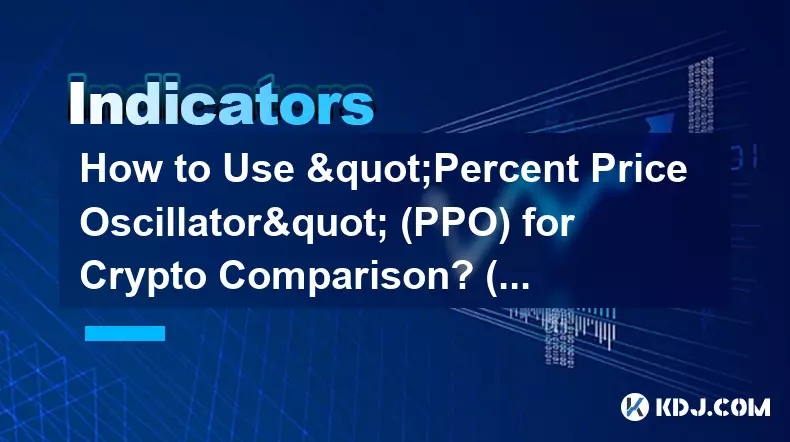
How to Use "Percent Price Oscillator" (PPO) for Crypto Comparison? (Strategy)
Feb 01,2026 at 01:59am
Understanding PPO Mechanics in Volatile Crypto Markets1. The Percent Price Oscillator calculates the difference between two exponential moving average...

How to Use "Dynamic Support and Resistance" for Crypto Swing Trading? (EMA)
Feb 01,2026 at 12:20am
Understanding Dynamic Support and Resistance in Crypto Markets1. Dynamic support and resistance levels shift over time based on price action and movin...

How to Use "Fixed Range Volume Profile" for Crypto Entry Zones? (Precision)
Feb 01,2026 at 10:19pm
Understanding Fixed Range Volume Profile Mechanics1. Fixed Range Volume Profile (FRVP) maps traded volume at specific price levels within a defined ti...

How to Identify "Symmetry Triangle" Breakouts in Altcoin Trading? (Patterns)
Feb 01,2026 at 01:39pm
Symmetry Triangle Formation Mechanics1. A symmetry triangle emerges when price action consolidates between two converging trendlines—one descending an...

How to Use "Negative Volume Index" (NVI) to Track Crypto Smart Money? (Pro)
Feb 01,2026 at 02:40am
Understanding NVI Mechanics in Crypto Markets1. NVI calculates cumulative price change only on days when trading volume decreases compared to the prio...

How to Spot "Absorption" in Crypto Order Books? (Scalping Technique)
Feb 01,2026 at 08:39pm
Understanding Absorption Mechanics1. Absorption occurs when large buy or sell orders repeatedly appear and vanish at the same price level without trig...

How to Use "Percent Price Oscillator" (PPO) for Crypto Comparison? (Strategy)
Feb 01,2026 at 01:59am
Understanding PPO Mechanics in Volatile Crypto Markets1. The Percent Price Oscillator calculates the difference between two exponential moving average...
See all articles










































































